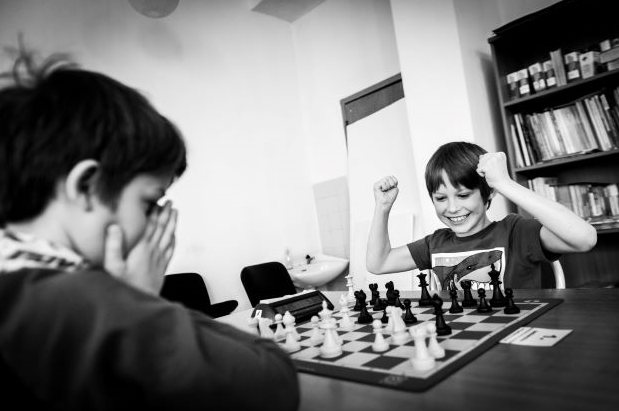Kids are constantly learning new skills, and the confidence that they build along the way is arguably just as important as the skills themselves. Children who trust their own capabilities and know how to rebound from failure are often more willing to take risks in life, have increased levels of happiness, and are more resilient in adulthood.
It takes time to build confidence in any activity, and if you have a child new to playing chess there are some simple things you can do to help boost their confidence, while teaching them valuable skills that will help them both on and away from the board.
Review Strong Games Together
Find a player your child looks up to and watch videos of games they’ve played. Take time to study the games with a lot of detail and be sure to analyze the nuances of why certain moves were played and why they worked well. This will not only help inspire your child, but will also help them add to their repertoire of moves they are confident enough to use when they play.
Teach A Concept To A New Player
Encourage your child to teach a younger sibling or friend that hasn’t played before a move or two. Teaching a favorite opening is a great place to start. Time spent teaching another player will not only boost their confidence, but will also help both players understand the moves better.
Focus On The Strengths
Pay attention to what your child does well (whether that be art, singing, writing, etc.) and give them chances to develop those strengths. This will help your child feel more confident overall, and as an added bonus can often help improve a child’s behavior.
Talk About Past Moments Of Glory
Take time to focus on past successes where your child worked hard and did really well at something. Remember that these don’t need to be chess related successes. The inner confidence they feel while thinking about past achievements will transfer to other areas of your child’s life, including on the chess board.
Model Good Behavior
It’s so important to set a good example, and try not to get overly upset about your own mistakes or your child’s. Consistently reiterate to your child that failures are going to happen, but the most important thing we can do is learn from them. Confident people don’t let failure get in the way, because they understand that while failure is inevitable, they have learned to take the setbacks in stride.
Praise Efforts
Avoid focusing all your praise on results, and offer praise on your child’s efforts instead. When talking to your child about their game you can say something along the lines of “I’m really proud of you for ….” Or “You sure are getting better and better at…” It’s also important not to overly praise – don’t tell your child they played a great game when they know they didn’t. Instead, show them that you hear their feelings by saying something along the lines of “I know that game wasn’t your best, we all have off days. But I’m proud of you for…” This helps boost your child’s confidence because they see that you noticed their efforts and hard work.
Set Goals And Monitor Progress
Some kids do really well with focusing on small, manageable goals. Focusing on meeting small goals and successes helps build up your child’s confidence a little bit at a time, improving their overall self-esteem.
Attend Chess Wizards Classes
Taking chess classes is another great way to boost your child’s confidence in the game. All of our classes feature an interactive curriculum in a fun group setting and are a perfect fit for children of all ages and skill levels. Our classes focus on improving critical thinking skills and learning good sportsmanship - all while building each child’s confidence and self-esteem.
Interested in trying a class with us? Contact us today to learn about Chess Wizards classes near you!

